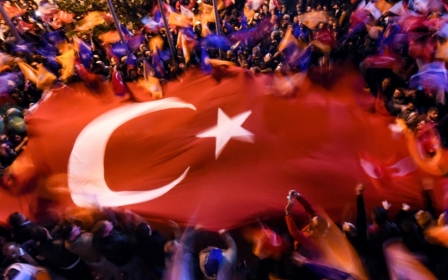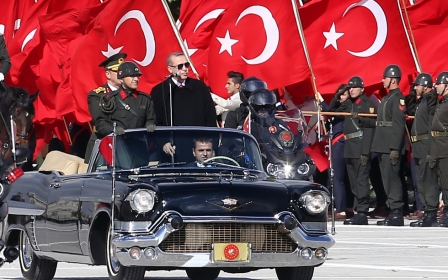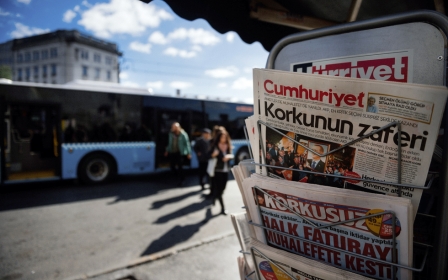As European capital retreats from Turkey, Arab investors step in
On a crisp November morning, hundreds of Turkish businessmen pack a modest seminar room in Istanbul to catch a glimpse of Rachid al-Ghannouchi, the leader of Tunisia's Nahda party. Straining to hear the Turkish translation of Ghannouchi's speech through their earpieces, the audience breaks into applause as the ideological peer of Turkish President Recep Tayyip Erdogan congratulates his AK party for its electoral victory on 1 November.
“The economic success of a nation is not for itself, but to be distributed among its poor,” Ghannouchi said, prompting grave nods from the businessmen.
The venue is the headquarters of the Independent Industrialists and Businessmen Association (MUSIAD), one of Turkey's largest trade unions, and the powerhouse behind the success of the ruling Justice and Development Party (AKP). MUSIAD began as an organisation for lending between pious Islamist traders in 1990, and has today grown to represent tens of thousands of companies that account for over 10 percent of Turkey's GDP.
Groups like MUSIAD are some of the most ardent supporters of building connections between Turkey and the Muslim world, especially the Arab countries in the region. Their lobbying had resulted in free trade agreements with Jordan and Lebanon by 2011. A larger free trade zone, dubbed “Shamgen,” would have included Syria if not for the 2011 uprising there. Free trade agreements with Iran and Iraq are even in the works.
Turkey is undergoing a major cultural and economic shift. For those looking from Europe, the country's political instability and proximity to war-torn Iraq and Syria are reasons to pull out. But for those looking from the Middle East and North Africa (MENA), Turkey is an island of promise with a long historical relationship. Foreign direct investment from the EU has dropped by 52 percent over the last year. Yet MENA investors are bullish, doubling their investment in the same period, and now accounting for a similar fraction of total foreign investment in Turkey as the EU.
Turkey's economic miracle, its growth to become the world's 18th largest economy in the last 13 years was fuelled largely by trade with the EU, but that is now changing. Of the 44,245 foreign companies registered in Turkey by June 2015, 45 percent were from the EU and 30 percent from MENA.
With the European economy stagnating, experts like Oguz Satici, who has served as an advisor on foreign investment during several AKP governments, says Turks will continue to build ties in MENA.
“As [the] Turkish economy opens its borders and becomes exposed to global competition, they have realised the necessity to establish a strong regional base,” said Satici, who served as chairman of the Turkish Exporter's Assembly from 2001-2008. With its regional proximity and cultural ties, Satici says the Middle East is a “natural area of expansion”.
Small businesses from Syria and Iraq
More than half of new foreign companies registered in the first half of 2015 in Turkey belonged to Syrians and Iraqis, men like Muhammad Salaam, who is taking a break from helping customers in a small clothing shop in Istanbul's central Aksaray district.
Four months ago, Salaam, tall and slim with a close greying beard, decided it was time to leave his native Iraq and move his family to Turkey, when it became clear that Islamic State (IS) militants had solidified control over his city of Mosul. Salaam had made four previous trips to Turkey since 2010, cutting deals for iron to be imported to Iraq, as well as connecting Turkish investors with those controlling oil fields near Mosul.
“Turkey is nearby my home [in Iraq], and I am familiar with the culture, so I came here,” he explained. Along with the clothing shop, Salaam earns commission from renting apartments, and has opened a small restaurant offering Iraqi cuisine down the street.
Arabs like Salaam are changing the face of Turkish neighbourhoods. Diners pore over menus in Arabic offering foul and falafel, and cafes offer sweet Iraqi tea. Arab immigrants have set up one-stop shops offering everything from translation services and rental listings to help with registering for Turkish residence permits and import and export licenses.
“I do not worry about learning Turkish,” he told Middle East Eye with a grin. “I think the Turks will learn Arabic.”
Investing in real estate
Middle Eastern investors “are keen to invest in Turkey, and real estate is the most expensive kind of investment you can make,” said Gorken Vardar, general manager of Memory International. Half of the real estate company's 12 employees speak Arabic. It puts out ads in Arabic, and travels to conferences in the Gulf, hoping to woo Arab investors who spend more than $4.3bn a year on real estate in Turkey.
In 2012, Istanbul lifted a law allowing only foreigners from countries where Turks could also own property to buy real estate in Turkey, a move that opened the floodgates for wealthy Gulf investors. Of the more than 5,000 clients Vardar's company is currently handling, more than 65 percent are from MENA.
“They want a second home, or they see Turkey's market as cheaper than the EU but still growing, or they appreciate how it is easier to immigrate here.”
Europeans and Russians, once the largest investors in real estate, are now fearful of a declining economy, and are selling, said Vardar.
“Many of my customers from MENA say Turkey reminds them of their own countries,” explained Vardar.
“And they like the freedom here: if someone wants to go to the mosque, they can, and if someone wants to go to a nightclub, they are free to.”
Even countries like Egypt, the Arab world's most populous nation and third largest economy, might have a frosty political relationship with Ankara, but that has not kept businesses from reaping profits with Turkey.
“At the end of the day, everybody wants to make some profit,” said Zuhal Mansfield, who heads the Turkish-Egyptian Business Council, part of the Turkish Ministry of Economy's Foreign Economic Relations Board. Despite Anakara's criticism of Cairo's military rulers and calls for boycotts from both countries, Mansfield says hundreds of Turkish companies still operate in Egypt, and bilateral trade has remained at around $5bn a year since 2012.
“Normal people, they walk in the streets of cities like Istanbul and meet each other,” said Mansfield. “They know all these problems between countries are just politics.”
New MEE newsletter: Jerusalem Dispatch
Sign up to get the latest insights and analysis on Israel-Palestine, alongside Turkey Unpacked and other MEE newsletters
Middle East Eye delivers independent and unrivalled coverage and analysis of the Middle East, North Africa and beyond. To learn more about republishing this content and the associated fees, please fill out this form. More about MEE can be found here.




